Top Spring Poetry: Both Veterans and Newcomers Offer Thematically Diverse Work
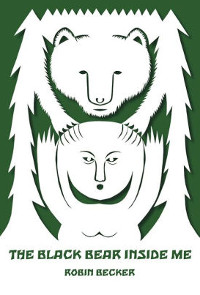 Becker, Robin. The Black Bear Inside Me. Univ. of Pittsburgh. Feb. 2018. 72p. ISBN 9780822965244. pap. $15.95. POETRY
Becker, Robin. The Black Bear Inside Me. Univ. of Pittsburgh. Feb. 2018. 72p. ISBN 9780822965244. pap. $15.95. POETRY
This graceful collection from Lambda Literary Award winner Becker (All-American Girl) uses accessible language to larger purpose. The first section illuminates only seemingly everyday moments, from a baby’s first “undulating hands” to a dog with “the wisdom of one well-loved/ from birth” to cede his bowl to a rescue. The second section goes personal (“I didn’t know a polonaise from an east coast swing”), while the third steps out to investigate the world at large (“How to account for the lacerated hands/ Of the enslaved, 15-year-old Cambodian deckhands”). Elegies abound (“after her death/ she hovered, a bird of bones and air”), creating not gloom but calm, though the title’s black bear lunges out to remind humans that “the land// that supports us// supports them.” VERDICT A wise, accomplished book for most readers.
Bouanani, Ahmed. The Shutters. New Directions. Jun. 2018. 172p. tr. from French by Emma Ramadan. ISBN 9780811227841. pap. $18.95; ebk. ISBN 9780811227858. POETRY
A significant cultural figure in 20th-century Morocco, Bouanani was reluctant to publish during his lifetime; along with stark depictions of war, famine, and the Spanish and French protectorates, his work scorned the government (“My country has lived for centuries off of the lies of the dead”). Many of his manuscripts were lost to fire, but this collection of mostly poems and some prose does what Bouanani wanted: “For the things I loved the most/ I want to keep my memory intact…/ the place—the names—the actions—our voices.” The picture he offers isn’t pretty. The shuttered house of Bouanani’s youth, once “big as a dream,” became the locus of nightmare: “I remember the morning of maledictions,/ the city streets beaten to death, the sun among the empty books.” But it’s remarkable poetry. VERDICT Strong, instructive, strikingly translated.
Carlson-Wee, Kai. Rail: Poems. BOA. Apr. 2018. 104p. ISBN 9781942683582. pap. $16; ebk. ISBN 9781942683599. POETRY
Do lonesome young men still hop freight trains? They do in Carlson-Wee’s mournfully beautiful debut collection, which takes us through a world of “Boarded-up storefronts, burned-down/ apartments, highway signs that only name/ the dead.” The poet’s picture of a fading heartland captures the despair many Americans feel today, and he parallels economic and personal desperation; “I felt the roof of my head break and clatter/ to the floor,” says a poem pointedly titled “Depression.” Elsewhere, there’s tenderness and a sense of wonder: “Butterfly caught in the backwind, dancing a dead loop./ Friends now, I…/ shelter him under my shirt.” VERDICT Carlson-Wee effectively uses repetition to build tension in poems that are deceptively simple and homey, and the tempered language draws readers into his heartfelt lines. Even those who don’t typically read poetry will enjoy.
Coleman, Aaron. Threat Come Close. Four Way. Mar. 2018. 72p. ISBN 9781945588044. pap. $15.95. POETRY
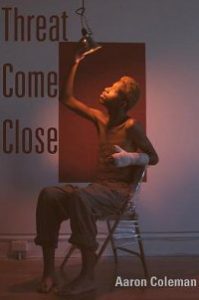 The first section of Fulbright Scholar Coleman’s ambitious, turbulent debut is appropriately titled “we weren’t safe,” as throughout he explores the African American experience both historical (“Black, escaped, free, native, rare// white, sweat-riddled ghosts”) and immediate (“Being/ Rage shattered in the body, before/ Each risk I live, let die, follow”). Some agitated poems fill the page vertically, but rage is balanced with outreach (“I need the rush of touch and take/ what’s in your pockets for a love just the same”). The speaker asks, “But what if we are made of this violence?” yet declares, “The trees teach me how to break and keep on living.” The middle poems are more erotic and meditative but in the end return to explosive mode. VERDICT Coleman’s knotty lines can be a challenge, but he knows his way around language, and the emotion is real.
The first section of Fulbright Scholar Coleman’s ambitious, turbulent debut is appropriately titled “we weren’t safe,” as throughout he explores the African American experience both historical (“Black, escaped, free, native, rare// white, sweat-riddled ghosts”) and immediate (“Being/ Rage shattered in the body, before/ Each risk I live, let die, follow”). Some agitated poems fill the page vertically, but rage is balanced with outreach (“I need the rush of touch and take/ what’s in your pockets for a love just the same”). The speaker asks, “But what if we are made of this violence?” yet declares, “The trees teach me how to break and keep on living.” The middle poems are more erotic and meditative but in the end return to explosive mode. VERDICT Coleman’s knotty lines can be a challenge, but he knows his way around language, and the emotion is real.
Dennis, Carl. Night School. Penguin (Poets). Apr. 2018. 112p. ISBN 9780143132356. $20; ebk. ISBN 9780525504337. POETRY
In the opening poem of his latest collection, Pulitzer Prize winner Dennis (Practical Gods) stands amid cottonwood trees that have taken root where sludge was once dumped and declares, “It’s time to focus on the life at hand.” Yet soon he imagines nearby strollers taking him for a “Late-blooming cottonwood creature” or “self-appointed surveyor of urban wetlands.” And in the following poem he creates multiple stories for a middle-aged woman eating alone, wanting to assure himself that she “Hasn’t made a wrong turn in life that’s deprived her/ Of friends and family.” Clearly, Dennis likes to look beyond to the world’s possibilities, rethinking what he sees, and he warns us that our paths aren’t set; his grandparents met only because of a train breakdown. VERDICT Seriously inventive and delightful; for most readers.
![]() Doan, Duy. We Play a Game. Yale Univ. (Series of Younger Poets). Mar. 2018. 104p. ISBN 9780300230871. pap. $20; ebk. ISBN 9781571318480. POETRY
Doan, Duy. We Play a Game. Yale Univ. (Series of Younger Poets). Mar. 2018. 104p. ISBN 9780300230871. pap. $20; ebk. ISBN 9781571318480. POETRY
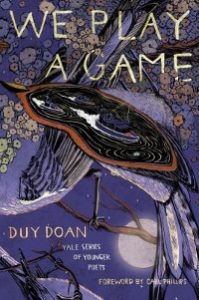 Bold, bright, yet decidedly unsettled and unsettling, this first collection—next in the Yale Series of Younger Poets—doesn’t so much explore Doan’s Vietnamese American experience as defy it. “When my brother/ and sisters and I talk about Vietnamese/ pronouns,// we’re ghosts/ reminiscing about facial expressions,” he proclaims, and in the poem “romanticizing Vietnam” states, “I fail to see// meaning in the white lotus// blossoming in the swamp.” Doan focuses instead on an exuberant physicality (sometimes edged with desperation), as many poems reference dance and sports and the speaker totes up erotic encounters with members of both sexes (“She had me in the car. I came forward like a song”). There’s personal pain, too (“One night I look up/ and bang/ our family/ has torn our family/ apart forever.” VERDICT Highly recommended.
Bold, bright, yet decidedly unsettled and unsettling, this first collection—next in the Yale Series of Younger Poets—doesn’t so much explore Doan’s Vietnamese American experience as defy it. “When my brother/ and sisters and I talk about Vietnamese/ pronouns,// we’re ghosts/ reminiscing about facial expressions,” he proclaims, and in the poem “romanticizing Vietnam” states, “I fail to see// meaning in the white lotus// blossoming in the swamp.” Doan focuses instead on an exuberant physicality (sometimes edged with desperation), as many poems reference dance and sports and the speaker totes up erotic encounters with members of both sexes (“She had me in the car. I came forward like a song”). There’s personal pain, too (“One night I look up/ and bang/ our family/ has torn our family/ apart forever.” VERDICT Highly recommended.
Douglas, Mitchell L.H. dying in the scarecrow’s arms: Poems. Persea. Mar. 2018. 96p. ISBN 9780892554874. $15.95. POETRY
While Douglas’s powerful /blak/ /al-fe vet/ chronicled his family’s journey north during the Great Migration, this new collection lands him in contemporary America, sometimes in his adopted Indianapolis and sometimes farther afield. It’s a place where “A man w/a wife/ & kids is dead/ over loosies,// & suddenly/ the centuries—17th & 21st—have burns/ to share,” and where, at a restaurant, the speaker must ask, “How do you keep/ your daughter’s mind on the feast/ before her, not the threat/ @her back?” There are sweet moments, too—a kiss in a cab—but these urgent, perfectly modulated poems exclaim (of flying birds or bullets), “Don’t tell me/ you can’t see.” The character Ení, Yoruba for “one” and pronounced “any,” strolls through this fiercely depicted world as alter ego and lyric muse. VERDICT Strong work for most collections.
Feldman, Chanda. Approaching the Fields: Poems. Louisiana State Univ. Feb. 2018. 64p. ISBN 9780807168295. pap. $16.95. POETRY
In her debut collection, former Stegner Fellow Feldman opens with a Southern landscape that’s kudzu-lush and animated (“Even the road flinches// alive—a snake whips dust”). But she focuses on the human: “Forget the dead// stay down, they persist as haints.” Here she recalls her share-cropping great-grandparents and grandparents, how “the year ended at the black schools in March” so children could work the fields, how she wore her father’s old ties and made strawberry-rhubarb slurry with her mother, and how her family’s life was shaped by Jim Crow (“separate entrances// at the doctor’s/... or/ the places we knew not to go”). VERDICT A spacious, considered, and beautifully paced family account that, properly, is not chronological, as past and present, grandparents and children, are braided together. Feldman concludes: “I will die wanting/ To hear again my name in the mouths/ of my old women.”
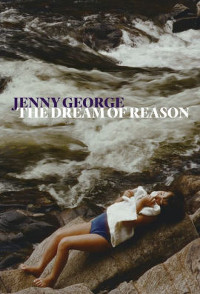 George, Jenny. The Dream of Reason. Copper Canyon. Apr. 2018. 72p. ISBN 9781556595196. pap. $16; ebk. ISBN 9781619321847. POETRY
George, Jenny. The Dream of Reason. Copper Canyon. Apr. 2018. 72p. ISBN 9781556595196. pap. $16; ebk. ISBN 9781619321847. POETRY
“Everything is restored,” says an early poem in this debut from George, winner of the Discovery/Boston Review Poetry Prize, but a creeping sense of unease upends the collection. The bat crawling across the porch “like a goblin” is dying, never mind the accompanying image of being enfolded in someone’s arms; something unseen stirs in the grass; and the disturbing sense of being watched on a starlit night portends violence—a word that resurfaces throughout the collection (“I take my violence out over the field”). That’s not surprising, as the title hints at an unsettling Goya print, and it’s interesting to see how such tactile poems succeed at suggesting the uncertain beyond, in a world where “we know a thing by its periphery.” VERDICT Eerie and approachable; solid work from a rising poet.
Hamby, Barbara. Bird Odyssey. Univ. of Pittsburgh. Feb. 2018. 88p. ISBN 9780822965251. pap. $15.95. POETRY
Extended riffs unwinding in one big propulsive surge, Hamby’s poetry always takes us on a journey. So it’s no surprise that her new work (after On the Street of Divine Love) jaunts across Siberia, motors through the South, and sails with Odysseus. The result is rich with cultural reference and contemporary insight, told in Hamby’s typically sly, witty, colloquial language. Encountering “Six Blackbirds on the Highway to Moscow,” she reflects, “I believe/ in the mystery of the universe, because as fast as one question/ is answered, another will unfold like crocuses.” “Three Vultures on the Blacktop to Memphis” are “reminders to take it all in because I’m heading/ somewhere on this misbegotten stretch of road and going fast.” The section “Chickadee at Troy” opens by addressing Athena, “O goddess of attitudes, yes, ma’am,/ …hear my prayer, because I’m adrift in a sea of words.” VERDICT Fun for all readers.
![]() Hayes, Terrance. American Sonnets for My Past and Future Assassins. Penguin. (Poets). Jun. 2018. 112p. ISBN 9780143133186. pap. $18; ebk. ISBN 9780525504962. POETRY
Hayes, Terrance. American Sonnets for My Past and Future Assassins. Penguin. (Poets). Jun. 2018. 112p. ISBN 9780143133186. pap. $18; ebk. ISBN 9780525504962. POETRY
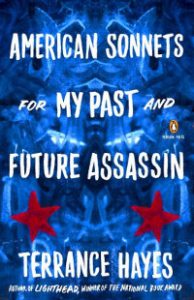 “Are you not the color of this country’s current threat/ Advisory? And of pompons at a school whose mascot/ Is the clementine?” It takes a moment to register that this ode to orange from National Book Award winner Hayes (Lighthead), one of 70 masterly sonnets inspired by the late Wanda Coleman’s American Sonnets, references Donald Trump. Written during the first 200 days of Trump’s administration, these meditations register righteous anger. “Probably twilight makes blackness dangerous/ Darkness,” advises one poem, and another: “The bones managing the body’s business are cloaked/ until you assassinate my nigga flesh.” But there’s celebration, too: “Seven of the ten things I love in the face/ of James Baldwin concern the spiritual/ elasticity of his expressions.” VERDICT “In a second I’ll tell you how little/ Writing rescues,” says Hayes, but his rescues a lot. Highly recommended.
“Are you not the color of this country’s current threat/ Advisory? And of pompons at a school whose mascot/ Is the clementine?” It takes a moment to register that this ode to orange from National Book Award winner Hayes (Lighthead), one of 70 masterly sonnets inspired by the late Wanda Coleman’s American Sonnets, references Donald Trump. Written during the first 200 days of Trump’s administration, these meditations register righteous anger. “Probably twilight makes blackness dangerous/ Darkness,” advises one poem, and another: “The bones managing the body’s business are cloaked/ until you assassinate my nigga flesh.” But there’s celebration, too: “Seven of the ten things I love in the face/ of James Baldwin concern the spiritual/ elasticity of his expressions.” VERDICT “In a second I’ll tell you how little/ Writing rescues,” says Hayes, but his rescues a lot. Highly recommended.
Hillman, Brenda. Extra Hidden Life, among the Days. Wesleyan Univ. Feb. 2018. 152p. ISBN 9780819578051. $24.95; ebk. ISBN 9780819578426. POETRY
It’s hard to sum up the grand sweep of this latest from Hillman (Practical Water), though her deconstruction of Robert Frost’s lovely woods helps: “they are also oblique, obscure, magical, owned for profit, full of fragile unnamed species, scarce on time, time that barely exists though people base their lives on imagining it does.” Thematically significant here, time dominates, as does the looming, viscerally rendered, and gorgeously obdurate natural world, both stretching out “as if/ humans were extra/ or already gone.” If a cello resounds, lovers part, a hawk chatters with Amiri Baraka, and a leaf is plucked at Hegel’s grave, the human gets swallowed, is indeed reflected in and defined by, barking seal pups and “drought-struggling laurel.” Beyond that, “the visible is thick but the invisible is thicker,” as there are answers none of us can give. VERDICT For all smart poetry readers.
Little, Margaree. Rest. Four Way. (Stahlecker Selections). Mar. 2018. 60p. ISBN 9781945588105. pap. $15.95. POETRY
While working for a humanitarian mission near Tucson, AZ, Little and a group of colleagues discovered the remains of an unidentified man in the desert who had been dead at least six months. That sobering discovery (“my friends and I carried the man we found/ together, the forty pounds of him”) inspired this accomplished first collection. It opens with Little’s mission work and expands to envision the deceased’s life at home (“If not the cane fields, …/ it could have been a city with white walls”), his arduous journey (“he carried a river on his back and drank from/ it that whole walk through the desert”), and the terrible what-ifs (what if “he went back home,.../ never put his mouth/ to the gravel here”). Little unflinchingly ponders life, death, and this hard world but offers succor, too: the piano music resounding throughout, Betty’s minestrone soup. VERDICT An important story affecting and effective in its simplicity.
Nguyen, Hieu Minh. Not Here. Coffee House. Apr. 2018. 120p. ISBN 9781566895095. pap. $16.95; ebk. ISBN 9781566895194. POETRY
In this second collection from Lambda finalist Nguyen (This Way to the Sugar), the pain is so real and raw that it nearly overflows the superbly crafted lines. This son of Vietnamese immigrants explores the horrors of the war that reshaped his family while limning his struggles with being gay in an unaccepting community. In particular, Nguyen affectingly highlights his difficult relationship with his mother, who “knelt in front of a shrine & asked// to be blessed with a daughter & I here I am: the wrong/ monster; truck stop prom queen in his dirt gown.” Yet by book’s end he asks, “When she is gone, who will call my name?” Memory is no plus; several “White Boy Time Machine” poems uncomfortably recall early, edgy sex, while elsewhere the poet proclaims: “descendants of flight/ enough already!” VERDICT Not easygoing but absorbing, important reading.
![]() Sotelo, Analicia. Virgin. Milkweed. Feb. 2018. 112p. ISBN 9781571315007. pap. $16; ebk. ISBN 9781571319777. POETRY
Sotelo, Analicia. Virgin. Milkweed. Feb. 2018. 112p. ISBN 9781571315007. pap. $16; ebk. ISBN 9781571319777. POETRY
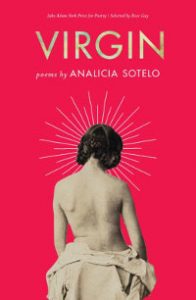 Winner of the inaugural Jake Adam York Prize, this dazzling new collection from Sotelo (Nonstop Godhead) seems written with opal grit. The poet highlights female subjugation to male assumptions and desires (“I am beautiful in my harmlessness!”) but offers considerable pushback, as Sotelo explores what women really want. In one poem, the speaker envisions her man fleeing “once he sees how far & wide,/ how dark & deep// this frigid female mind can go”; elsewhere, “When I’m with a man, I drag the yolk right out of him.” Sensuality and resistance go hand in hand, even as Ariadne surfaces to admonish, “When a man tells you he’s a monster,/ believe him.” VERDICT A moving section of this book clarifies the influences of the poet’s artist father, who teaches her the meaning of art: “This one is art. This is what art looks like.” She learned her lesson well.
Winner of the inaugural Jake Adam York Prize, this dazzling new collection from Sotelo (Nonstop Godhead) seems written with opal grit. The poet highlights female subjugation to male assumptions and desires (“I am beautiful in my harmlessness!”) but offers considerable pushback, as Sotelo explores what women really want. In one poem, the speaker envisions her man fleeing “once he sees how far & wide,/ how dark & deep// this frigid female mind can go”; elsewhere, “When I’m with a man, I drag the yolk right out of him.” Sensuality and resistance go hand in hand, even as Ariadne surfaces to admonish, “When a man tells you he’s a monster,/ believe him.” VERDICT A moving section of this book clarifies the influences of the poet’s artist father, who teaches her the meaning of art: “This one is art. This is what art looks like.” She learned her lesson well.
![]() Stein, Melissa. Terrible Blooms. Copper Canyon. Apr. 2018. 96p. ISBN 9781556595295. pap. $16; ebk. ISBN 9781571319777. POETRY
Stein, Melissa. Terrible Blooms. Copper Canyon. Apr. 2018. 96p. ISBN 9781556595295. pap. $16; ebk. ISBN 9781571319777. POETRY
Stein follows up Rough Honey, winner of the APR/Honickman First Book Prize, with more rough love. “If you’re going to storm,/ I said/ do it harder” opens the collection, and elsewhere the speaker insists, “What’s wrong/ with me is you.” Kneading dough hurts like a bruise, bombs fall like flowers of ice, a woman “kneels on her pain,” and what of life? “It’s all born lost/ and we just fetch it for a little while.” Yet if these poems are mordant, they’re also rich and sensual and glittering, and Stein delivers some bold aperçus: “the ruin I’ve made is in one piece,” says one poem, and elsewhere “I have a turnstile heart.” VERDICT If Stein wants to spin “to lose my bearings,” she wants us to spin, too. Excellent poetry.
Van Kley, Emily. The Cold and the Rust: Poems. Persea. Mar. 2018. 72p. ISBN 9780892554881. pap. $15.95. POETRY
Winner of the 2016 Lexi Rudnitsky First Book Prize, this debut revisits a queer childhood on Michigan’s Upper Peninsula, in a hometown so desolate that “even teenagers know better// than to believe in immortality.” It’s a landscape of dirty snow and frozen lakes, abandoned buildings and multiplying deer, where “the rifle’s chamber [is] explicable,” “Georgine smashes the shotglass/ because it is too empty,” and “We are a people who try not/ to lead by example.” Van Kley expertly captures the bleakness in laconic language, deftly balancing the exterior world and her interior, struggling self. “The place is still there/ you can’t imagine how unchanged,” but the speaker brims with restlessness and intelligence, and her portrait of a place she etches with acid and some tenderness is persuasive. VERDICT Forthright language that invites in all readers.
Wallace, Valerie. House of McQueen. Four Way. Mar. 2018. 68p. ISBN 9781945588112. pap. $15.95. POETRY
Readers opening this book without introduction may be puzzled by lines like “When staggering down the runaway wearing tartan over torn lace” or “Stained red medical slides layer vertically on sleeveless sheath,” but all become clear with the understanding that this winner of the Four Way Books Intro Prize in Poetry is a meditation in verse on daring designer Alexander McQueen. Wallace shows us the sheer physicality of the work (“I think with my bare hands”) while capturing creativity in the act. “The world is not a mirror” but something actively envisioned, and “maybe body’s true/ Beauty & its soothing filth” is what we, like McQueen, should seek. The lines can be opaque and twisty, but the poems always land on their feet. VERDICT With it skittering language, not for your average fashionista, but serious readers will find rich rewards.
![]() Wakoski, Diane. Lady of Light: New Poems. Anhinga. Jun. 2018. 234p. ISBN 9781934695586. pap. $22. POETRY
Wakoski, Diane. Lady of Light: New Poems. Anhinga. Jun. 2018. 234p. ISBN 9781934695586. pap. $22. POETRY
Including recent work as well as poems dating back nearly two decades that didn’t fit into other collections, this sumptuous feast by William Carlos Williams Award winner Wakoski (Emerald Ice) reveals the grand, vivid, shining, ebullient interior life of a poet who is remarkably self-effacing (“If I were a jellybean, I’d be the/ purple one nobody wanted.” Wakoski’s observant poetry moves from the rosebush of her childhood (which “gave me the feeling/ that I was seeing/ a jeweler take out a cut ruby/ to place it on a/ velvet tray for my viewing”) to a beautiful series of meditations on Daniel Barenboim at the piano; she charges even the simplest events, such as eating an oyster, with emotion and meaning. VERDICT The title comes from Wakoski’s habit of signing her correspondence “I remain Yr Lady of Light, Diane,” and these poems surely sparkle.
Add Comment :-
RELATED
ALREADY A SUBSCRIBER? LOG IN
We are currently offering this content for free. Sign up now to activate your personal profile, where you can save articles for future viewing








